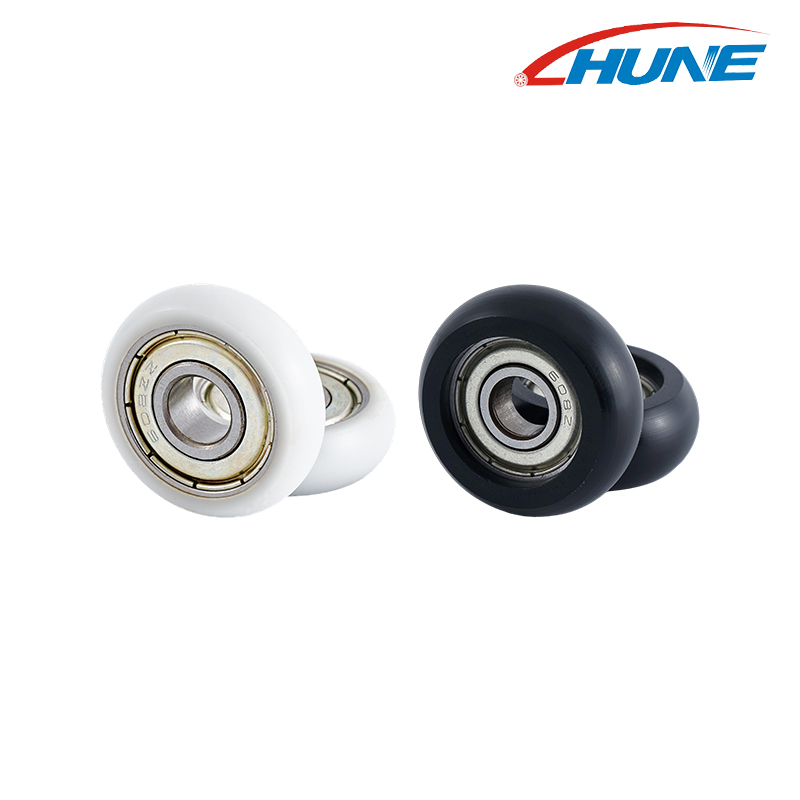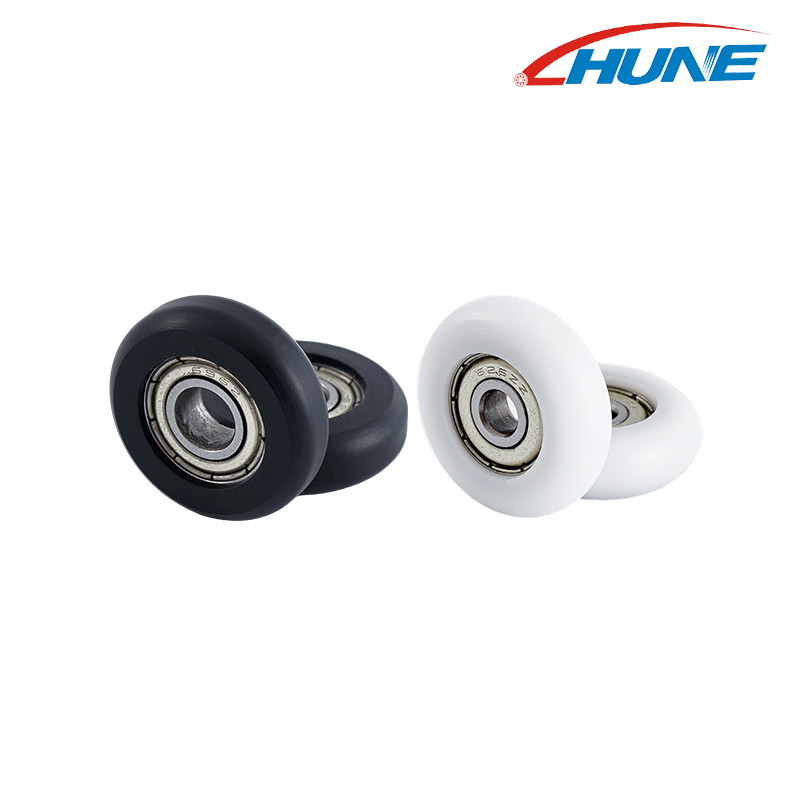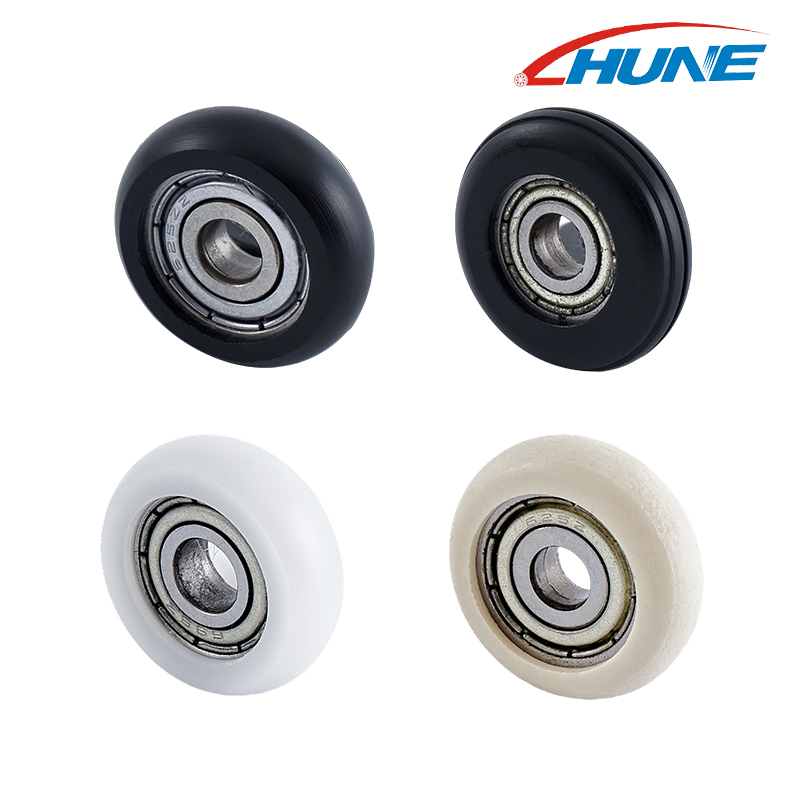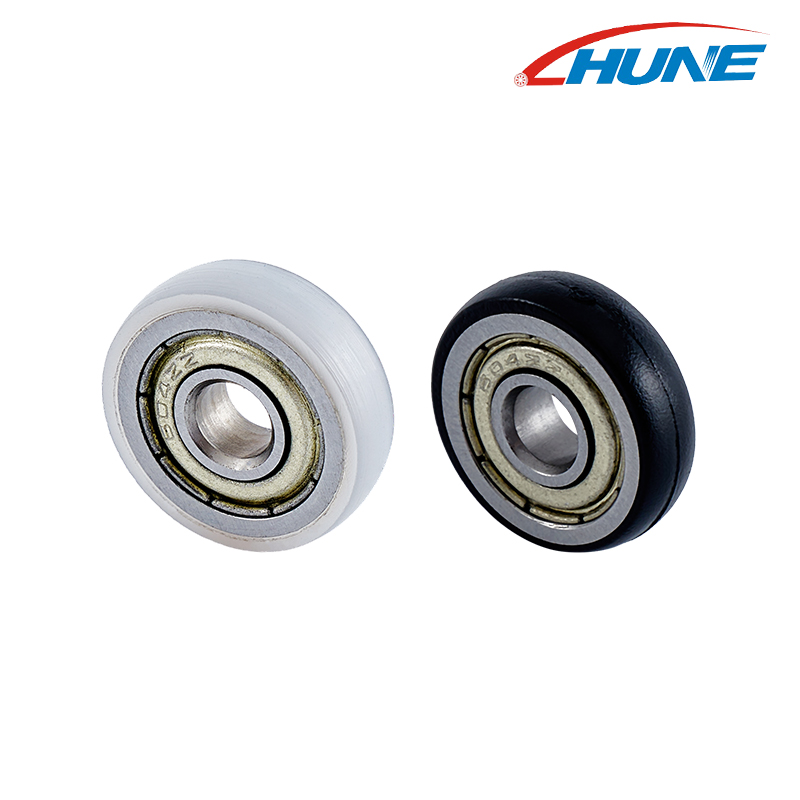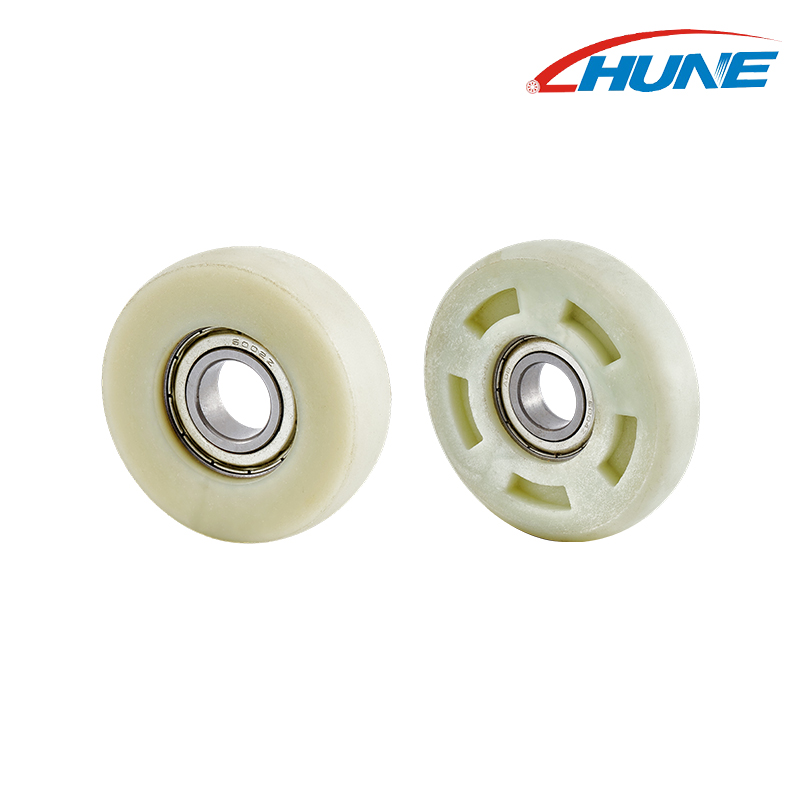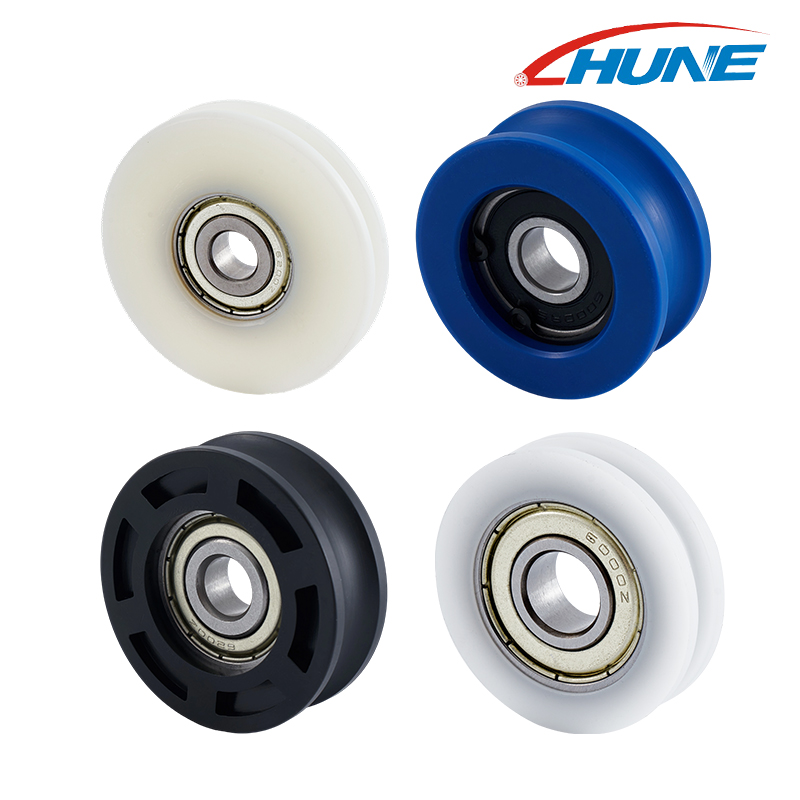Window sliding rollers are essential for smooth, quiet, and efficient operation of sliding windows and doors. However, when rollers are dirty, worn, or poorly maintained, they can cause a range of problems, including excessive noise, increased friction, and even damage to the window system.
Impact of Dirt and Debris
Dust, dirt, and debris can accumulate on rollers and tracks over time. This buildup interferes with smooth motion, causing grinding or squeaking sounds when sliding windows are opened or closed. Dirt also increases friction, which places extra stress on the roller and the track, accelerating wear and reducing the overall lifespan of the components.
Consequences of Poor Maintenance
Neglecting regular cleaning, lubrication, or inspection can lead to roller misalignment, bearing failure, and surface damage on both rollers and tracks. Over time, this not only creates operational noise but may also make windows harder to open and close, reducing comfort and safety. In extreme cases, poorly maintained rollers can cause permanent damage to the window frame or track system, leading to costly repairs or replacements.
Components of a Roller
Understanding the components of a window sliding roller can help in proper maintenance and troubleshooting:
- Wheel: The primary part that glides along the track; smooth surfaces reduce friction and noise.
- Bearing: Allows the wheel to rotate freely and supports load; precision bearings improve durability and quiet operation.
- Housing: Encases the wheel and bearing, providing structural stability and alignment.
- Axle: Connects the wheel and bearing to the housing; ensures smooth rotation and load transfer.
- Track Interface: The surface on which the roller moves; clean and well-lubricated tracks are essential for optimal performance.
How Roller Quality Impacts Window Performance and Lifespan?
The quality of window sliding rollers directly affects the smoothness, noise level, and longevity of sliding windows and doors. High-quality rollers are made from durable materials such as nylon, polyurethane, or rubber-coated steel, often with precision ball bearings. These materials and designs reduce friction, absorb vibrations, and ensure quiet, effortless operation.
Performance and Smooth Operation
Premium rollers allow windows to glide smoothly along tracks, preventing jerks, sticking, or squeaking. In contrast, low-quality rollers can produce noise, increase friction, and make windows difficult to operate. Smooth and precise roller operation enhances comfort and usability in both residential and commercial settings.
Longevity and Durability
High-quality rollers withstand wear and environmental factors like dust, moisture, and temperature fluctuations. This reduces the risk of roller failure, track damage, and premature replacement. Investing in quality rollers extends the overall lifespan of sliding windows, minimizes maintenance needs, and ensures consistent performance over time.
Essential Tools and Materials for Cleaning and Maintenance
Proper maintenance is key to prolonging roller performance and window lifespan. Essential tools and materials include:
- Soft Brush or Cloth: For removing dust, dirt, and debris from rollers and tracks.
- Vacuum Cleaner with Nozzle Attachment: Helps clear hard-to-reach debris in tracks.
- Lubricant (Silicone or Teflon-Based): Reduces friction in bearings and ensures quiet, smooth sliding.
- Screwdriver or Allen Wrench: For adjusting or removing rollers during inspection or replacement.
- Mild Cleaning Solution: Removes grime and prevents buildup without damaging roller material.
- Protective Gloves: Optional, to protect hands while handling rollers or cleaning chemicals.
Maintenance Tips:
- Clean rollers and tracks regularly to prevent debris buildup.
- Apply lubricant sparingly to bearings and wheel surfaces for smooth motion.
- Inspect rollers for wear, cracks, or misalignment and replace if necessary.
- Ensure tracks are straight, free of obstructions, and properly aligned to maintain optimal performance.
Step-by-Step Guide to Cleaning Window Sliding Rollers
Proper maintenance of window sliding rollers is essential to ensure smooth, quiet, and long-lasting operation of sliding windows and doors. Dirt, debris, and lack of lubrication can cause noise, friction, and premature wear.
Step 1: Gather Essential Tools and Materials
Before starting, prepare the following:
- Soft brush or cloth for dust and debris removal
- Vacuum cleaner with nozzle attachment for tracks
- Mild cleaning solution
- Lubricant (silicone or Teflon-based)
- Screwdriver or Allen wrench for roller removal
- Protective gloves
Step 2: Remove the Window Sash
Carefully lift or slide the window sash out of the frame to access the rollers. If necessary, use a screwdriver or Allen wrench to detach the rollers from the window for thorough cleaning.
Step 3: Clean Rollers and Tracks
- Use a soft brush or cloth to remove dust, dirt, and debris from each roller and its housing.
- Vacuum the track to remove trapped particles.
- Wipe the tracks and rollers with a mild cleaning solution to remove grime.
Step 4: Inspect Rollers for Wear and Damage
Check each roller for signs of wear, cracks, or misalignment. Ensure the bearings spin freely and that the wheel is not damaged. Replace any damaged or worn rollers to maintain smooth operation.
Step 5: Lubricate Rollers and Tracks
Apply a small amount of silicone or Teflon-based lubricant to the roller bearings and the track interface. Avoid using oil-based lubricants, as they can attract dirt and dust. Lubrication reduces friction, prevents noise, and prolongs the life of the rollers.
Step 6: Reinstall Rollers and Window Sash
Carefully reattach the rollers to the window sash, ensuring they are properly aligned with the tracks. Slide the sash back into the frame and test the movement. The window should glide smoothly and quietly without resistance or noise.
Step 7: Regular Maintenance Schedule
- Clean rollers and tracks every 3–6 months or more frequently in dusty environments.
- Inspect for damage and reapply lubricant as needed to maintain optimal performance.
- Keep the track free of debris to prevent wear and prolong roller lifespan.
|
Step |
Action |
Details / Tips |
|
1. Gather Essential Tools and Materials |
Prepare all necessary tools |
Soft brush or cloth, vacuum with nozzle, mild cleaning solution, silicone or Teflon-based lubricant, screwdriver/Allen wrench, protective gloves |
|
2. Remove the Window Sash |
Detach sash to access rollers |
Lift or slide the window sash carefully; use tools to remove rollers if needed for thorough cleaning |
|
3. Clean Rollers and Tracks |
Remove dirt, dust, and debris |
Use soft brush/cloth for rollers, vacuum for tracks, wipe with mild cleaning solution to remove grime |
|
4. Inspect Rollers for Wear and Damage |
Check each component |
Look for cracks, misalignment, or worn bearings; replace damaged rollers to ensure smooth operation |
|
5. Lubricate Rollers and Tracks |
Apply proper lubrication |
Use silicone or Teflon-based lubricant on bearings and track; avoid oil-based lubricants as they attract dust |
|
6. Reinstall Rollers and Window Sash |
Reassemble carefully |
Attach rollers properly, slide sash into frame, test for smooth and quiet movement |
|
7. Regular Maintenance Schedule |
Maintain rollers over time |
Clean and inspect every 3–6 months, reapply lubricant as needed, keep tracks free of debris |
Lubrication and Oiling Techniques for Window Sliding Rollers
Proper lubrication is a key factor in ensuring smooth, quiet, and long-lasting operation of window sliding rollers. Over time, friction between the roller, bearing, and track can cause noise, wear, and difficulty in sliding. Using the right lubrication techniques can significantly improve performance and extend the lifespan of your windows.
1. Choosing the Right Lubricant
- Silicone-Based Lubricants: Ideal for window sliding rollers as they reduce friction without attracting dust.
- Teflon-Based Lubricants: Provide long-lasting lubrication and excellent noise reduction.
- Avoid Oil-Based Lubricants: Oils can attract dirt and debris, leading to increased friction and wear.
2. Proper Lubrication Techniques
- Clean rollers and tracks thoroughly before applying lubricant to remove dust, dirt, and debris.
- Apply lubricant sparingly to the roller bearings and wheel surfaces; over-lubrication can cause dirt accumulation.
- For sealed bearings, apply lubricant at the edges to maintain smooth rotation without compromising the seal.
- Move the window or door back and forth several times to evenly distribute the lubricant along the rollers and track.
3. Frequency of Lubrication
- Perform lubrication every 3–6 months depending on usage frequency and environmental conditions.
- In dusty or outdoor environments, check and reapply lubrication more frequently to maintain optimal performance.
Preventive Maintenance Tips for Window Sliding Rollers
Regular preventive maintenance ensures your window sliding rollers remain quiet, smooth, and durable. It reduces the risk of damage and prolongs the life of the window system.
1. Regular Cleaning
- Remove dust, debris, and grime from rollers and tracks using a soft brush or vacuum cleaner.
- Clean with a mild solution to remove sticky residues that can impede movement.
2. Inspection for Wear and Damage
- Check rollers, bearings, and tracks for cracks, misalignment, or worn surfaces.
- Replace damaged components promptly to avoid further issues.
3. Track Alignment
- Ensure the tracks are straight and free of obstructions.
- Misaligned or bent tracks increase friction and noise, accelerating wear on rollers.
4. Smooth Operation Testing
- Open and close windows regularly to test for smooth movement.
- Listen for unusual noise, which may indicate the need for cleaning, lubrication, or replacement.
5. Environmental Considerations
- Protect rollers from excessive moisture, dust, or debris, especially in outdoor or industrial settings.
- Use protective covers or ensure proper drainage to reduce exposure to damaging elements.
Repairing or Replacing Window Sliding Rollers
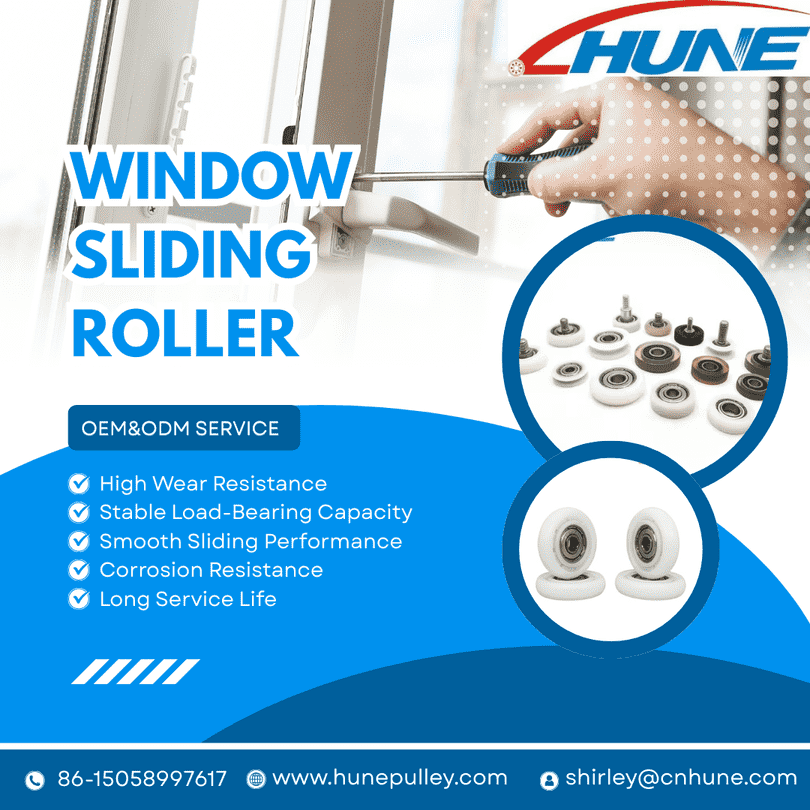
Window sliding rollers are critical components that ensure smooth, quiet, and efficient operation. Over time, rollers may wear out, become misaligned, or suffer damage due to dirt, friction, or heavy usage. Timely repair or replacement is essential to maintain optimal performance and prolong the lifespan of your windows.
1. Signs That Rollers Need Repair or Replacement
- Windows are difficult to open or close smoothly.
- Grinding, squeaking, or rattling noises when sliding.
- Visible wear, cracks, or broken bearings on the roller.
- Misaligned or wobbly rollers causing uneven movement.
2. Repairing Window Sliding Rollers
- Cleaning and Lubrication: For minor issues, thorough cleaning and proper lubrication may restore smooth operation.
- Adjusting Alignment: Check the roller height and position within the track; adjust screws or mounting hardware to correct misalignment.
- Bearing Replacement: If the bearing is worn but the wheel is intact, replacing only the bearing can restore functionality.
3. Replacing Window Sliding Rollers
- Remove the Window Sash: Carefully lift or slide the sash out of the frame.
- Detach Old Rollers: Use appropriate tools like screwdrivers or Allen wrenches to remove damaged rollers.
- Install New Rollers: Choose high-quality, compatible rollers and secure them properly in the housing.
- Test Smooth Operation: Slide the window back and forth to ensure quiet, smooth, and proper alignment.
Advanced Maintenance Strategies for Window Sliding Rollers
Regular maintenance keeps rollers in optimal condition, but advanced strategies can further extend lifespan and enhance performance.
1. Scheduled Maintenance Plans
- Implement a consistent maintenance schedule, including cleaning, lubrication, and inspection every 3–6 months.
- Adjust the schedule based on usage frequency and environmental conditions.
2. Protective Measures
- Use track covers or seals to prevent dirt, dust, and moisture accumulation.
- Apply corrosion-resistant coatings to rollers and tracks in outdoor or humid environments.
3. Upgrading Components
- Consider high-quality rollers with precision bearings for quieter and smoother operation.
- Upgrade to rollers with vibration-dampening or noise-reducing materials for increased comfort.
4. Monitoring and Early Intervention
- Regularly check for early signs of wear, unusual noise, or misalignment.
- Address minor issues immediately to prevent costly repairs or full replacements.
5. Professional Assistance
- For complex window systems or heavy-duty industrial sliding panels, consult professional service providers for installation, repair, or preventive maintenance.
- Professional inspections can identify hidden issues and recommend the most effective solutions.
Choosing Quality Rollers to Reduce Maintenance – Why Choose Door & Window Roller Factory Hune
Selecting high-quality rollers is crucial for ensuring smooth, quiet, and long-lasting operation of doors and windows. Low-quality rollers can lead to excessive friction, noise, misalignment, and frequent maintenance, which increases costs and reduces the lifespan of your sliding systems. Investing in premium rollers not only enhances performance but also minimizes the need for repairs and replacements over time.
Hune – A Professional Door & Window Roller Factory
Hune is a trusted manufacturer specializing in high-quality door and window rollers. With years of experience and expertise in roller design and production, Hune focuses on delivering durable, precision-engineered products that meet the demands of residential, commercial, and industrial applications. Their commitment to quality ensures that every roller provides smooth, quiet operation and long-lasting performance.
Reasons to Choose Hune:
- Superior Quality: Rollers are made from premium materials such as nylon, polyurethane, and rubber-coated steel, ensuring durability and resistance to wear.
- Precision Engineering: Advanced bearing systems and vibration-dampening designs provide smoother operation and reduced noise.
- Customizable Solutions: Hune offers rollers tailored to specific loads, track types, and application requirements, accommodating both standard and specialized projects.
- Reliable Service: Professional support from manufacturing to delivery, with consistent quality control and after-sales assistance.
- Reduced Maintenance Needs: High-quality Hune rollers require less frequent servicing, saving time and costs while extending the lifespan of doors and windows.
By choosing Hune as your door and window roller supplier, you ensure optimal performance, quiet operation, and durability. High-quality rollers from Hune reduce maintenance, prevent premature damage, and enhance the overall functionality of your sliding systems.
Investing in quality rollers is key to reducing maintenance and ensuring long-term performance. Hune, as a professional door and window roller factory, provides reliable, precision-engineered solutions that enhance comfort, durability, and efficiency. For anyone seeking high-performance rollers, Hune is a trusted partner that delivers superior products and service worldwide.






 English
English  Español
Español  日本語
日本語 